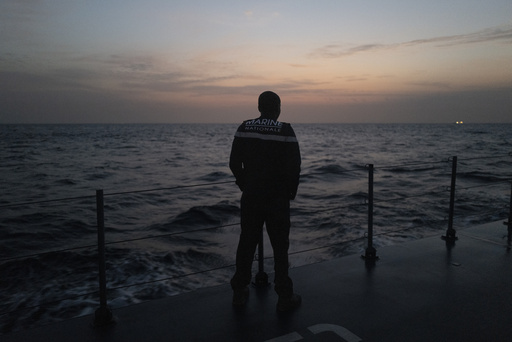
DAKAR, Senegal — As the sun broke over the coastline of Senegal, navy commander Assane Seye conducted a watchful survey of the sea.
He leads the Niani, one of three newly deployed patrol ships designated to monitor the waters off this West African nation, where an increasing number of precarious vessels filled with migrants are observed.
Many individuals cram into wooden boats known as pirogues, embarking on perilous journeys toward Spain’s Canary Islands — a preferred destination for West African migrants seeking improved living conditions in Europe.
Recently, the public had a rare opportunity to accompany the navy on a nighttime patrol.
With trained eyes, Seye and his team can easily distinguish whether a boat is fishing or involved in migration efforts by observing the number of people on board.
“Since January 1, 2024, we have rescued 4,780 individuals,” he noted, indicating a rise compared to 2023 statistics.
Lieutenant Oumar Ndiaye recounted an interception that took place a month earlier, where they found over 200 migrants on a single wooden vessel.
“Conditions on the pirogue were appalling; many had already endured two or three days at sea,” he said, emphasizing the humanitarian aspect of their mission.
Commander Seye stated that the navy has a moral obligation to ensure the safety of migrants, regardless of whether they request assistance.
“A sudden change in weather or a single erroneous maneuver by the captain could capsize the pirogue, putting lives at grave risk,” he warned.
The patrol teams take the rescued migrants aboard and transport them back to shore.
Upon arrival, individuals are allowed to disperse — many may attempt the journey again, while others from different nations face repatriation.
The Mediterranean previously served as the principal route for West African migrants heading to Europe; however, the European Union has allocated funds to Libya and Tunisia, common points for departures in North Africa, in an effort to reduce migration through those channels.
Consequently, the route toward the Canary Islands has gained popularity. According to statistics from the Spanish interior ministry, the number of “irregular” migrants arriving in Spain reached almost double that of the same period in 2023 by June, totaling nearly 25,000 landings in the first half of 2024.
In a bid to curtail smuggling, the EU inked a significant 210 million euro agreement with Mauritania, Senegal’s neighboring country, earlier this year.
Both the Mediterranean and Canary Island routes carry significant dangers.
While exact death figures remain elusive due to limited information on boats departing from West Africa, the migrant rights organization Walking Borders estimates that thousands have perished on the Canary Islands route in 2023 alone.
Some distressed vessels have been found drifting across the Atlantic, their abandoned bodies raising questions for those who encounter them.
In Senegal, migration remains a polarizing topic.
New President Barrious Diomaye Faye, who won the presidency by promising reforms to uplift the living standards of ordinary citizens, aims to deter people from leaving their homeland.
His proposed initiatives involve re-negotiating fishing agreements with foreign nations, often criticized for depleting local resources, and ensuring a greater share of Senegal’s natural wealth benefits its inhabitants.
With over 60% of Senegal’s population under the age of 25 and 90% employed in the informal sector, many young people have observed the profits from natural resources finishing abroad.
Senegalese citizens participated in legislative elections on Sunday, which followed the president’s decision to dissolve the opposition-led parliament in September.
A parliamentary majority would empower him to implement his proposed reforms.
Nonetheless, despite the hazards linked to the journey to Europe, some young Senegalese remain undeterred, arguing that the dire economic conditions at home leave them with little alternative.
